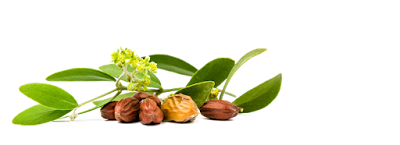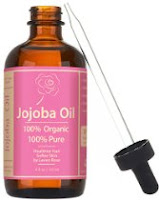Jojoba Oil is Remarkable
antibacterial, antifungal, anti-inflammatory, moisturizer, vitamins, minerals, diet supplement, beverage, and more
By Eugenia Martini-Jarrett
Jojoba has become a major ingredient in beauty and health products, with good reason.
Jojoba is also known as goat nut, deer nut, pignut, wild hazel, quinine nut, coffeeberry, and gray box bush, The plant's lifespan is 100-200 years, which tells you something right there.
The plant is a hearty perennial evergreen shrub growing up to 15 feet, depending on its location and weather. It is native to the Sonoran Desert of northwestern Mexico and several neighboring regions in Arizona and southern California, growing in a variety of terrains and climates, as long as it does not get below 25 degrees for more than a few hours.
Jojoba's antibacterial, antifungal, and anti-inflammatory properties, as well as an array of B vitamins, Vitamin E, minerals, iodine, and more, make it a coveted ingredient for healthy skin and hair.
Native Americans have been using Jojoba for hundreds of years for the treatment of bruises, sores, burns, and skin irritations, skin conditioners, diet supplements, hair and scalp treatment, hair restoration, and skin softener. Also, when the seeds were roasted they created a coffee-like beverage.
 Every year around August the Jojoba shrub produces a bean that resembles a small olive or coffee bean. These nuts/beans/seeds (called by all three terms) contain an oil that is odorless and clear; however, not oily or tacky.
Every year around August the Jojoba shrub produces a bean that resembles a small olive or coffee bean. These nuts/beans/seeds (called by all three terms) contain an oil that is odorless and clear; however, not oily or tacky.
Jojoba is also known as goat nut, deer nut, pignut, wild hazel, quinine nut, coffeeberry, and gray box bush, The plant's lifespan is 100-200 years, which tells you something right there.
The plant is a hearty perennial evergreen shrub growing up to 15 feet, depending on its location and weather. It is native to the Sonoran Desert of northwestern Mexico and several neighboring regions in Arizona and southern California, growing in a variety of terrains and climates, as long as it does not get below 25 degrees for more than a few hours.
Jojoba's antibacterial, antifungal, and anti-inflammatory properties, as well as an array of B vitamins, Vitamin E, minerals, iodine, and more, make it a coveted ingredient for healthy skin and hair.
Native Americans have been using Jojoba for hundreds of years for the treatment of bruises, sores, burns, and skin irritations, skin conditioners, diet supplements, hair and scalp treatment, hair restoration, and skin softener. Also, when the seeds were roasted they created a coffee-like beverage.
 Every year around August the Jojoba shrub produces a bean that resembles a small olive or coffee bean. These nuts/beans/seeds (called by all three terms) contain an oil that is odorless and clear; however, not oily or tacky.
Every year around August the Jojoba shrub produces a bean that resembles a small olive or coffee bean. These nuts/beans/seeds (called by all three terms) contain an oil that is odorless and clear; however, not oily or tacky.
There are about 1700 seeds in a pound -
17 pounds of Jojoba seeds are needed to generate one gallon of oil.
17 pounds of Jojoba seeds are needed to generate one gallon of oil.
Jojoba oil is different from other vegetable oils. Instead of being an oil, it is a polyunsaturated liquid wax that resembles sperm whale oil - a liquid wax ester extracted from its seed.
Jojoba oil is plentiful without endangering the whale population and its cost is minimal in comparison. Since Jojoba oil is not greasy or tacky and is a wax, provides moisture control and protection. Another important fact is that Jojoba oil does not clog pores, and is hypoallergenic and nontoxic.
Jojoba oil is plentiful without endangering the whale population and its cost is minimal in comparison. Since Jojoba oil is not greasy or tacky and is a wax, provides moisture control and protection. Another important fact is that Jojoba oil does not clog pores, and is hypoallergenic and nontoxic.
Jojoba oil is similar to sebum (a secretion from human glands and scalp to lubricate and protect skin and hair).
Jojoba oil is similar to sebum (a secretion from human glands and scalp to lubricate and protect skin and hair). Sebum is needed to nourish, protect and keep your scalp and hair healthy. Increasing the use of Jojoba as individuals age helps minimize the effects of the wear and tear of stress, pollution damage, etc.
At room temperature, Jojoba oil is a liquid. Great news - It does not oxidize or become rancid and does not break down under high temperatures and pressures. Jojoba oil can be heated to 370°F (188°C) for 96 hours without exhibiting degradation in general composition.
There are certain common skin fungi and five skin bacteria that studies have proven can not survive in Jojoba oil. The staphylococcus and pseudomonas bacteria are destroyed within one hour and 15 minutes from the application of the Jojoba oil.
 |
Click to view product |
USES FOR JOJOBA OIL
- Effective Cleanser
- Remove eye makeup (does not irritate eyes)
- Skin Conditioner
- Skin Moisturizer
- Skin Softener
- Reduces Pore Size
- Hair Moisturizer
- Hair Softener
- Beard Softener for Men
- Reduce Wrinkles
- Reduce Stretch Marks
- Treats Dry, Cracked and Chapped Skin
- Sunburn Relief
- Can Help Heal Acne, Pimples, Warts, Athlete's Foot
- Helps Lighten and Heal Scars
- Unclogs Hair Follicles
- Essential Oils Base
JOJOBA IS USED IN:
- Shampoos
- Conditioners
- Facial Products
- Skin Moisturizers and Lotions
- Nail Products
- Oils and Soaps
- Sunscreens
- Makeup
- Perfumes
- Detergents
- Weight Loss Supplements
- Appetite Suppressants
- Note: Since Jojoba oil does not oxidize or go rancid it is mixed with other oils to provide a longer shelf life. It also does not have any side effects that have been reported over the past hundreds of years.
__________________________________________
Visit our Reconnecting To Health Facebook page and LIKE it :).
Join the Reconnecting To Health Facebook GroupFollow Us on Twitter
__________________________________________
Eugenia Martini-Jarrett is the founder/owner of Reconnecting To Health, Eugenia's Art Gallery, and FashionologyBiz.
Reconnecting To Health is dedicated to promoting health and wellness through holistic, organic, and natural methods for the body, mind, emotions, and spirit. Eugenia is an avid holistic health advocate and researcher, an artist, former associate editor and partner of the world-renowned publication, "In Light Times" (for over 17 years); a published writer, editor, and copywriter. photojournalist and publisher. Eugenia also holds her certification as a Reconnective Healer for over 15 years and has been an avid natural healing and wellness advocate and consultant for over 30 years.












